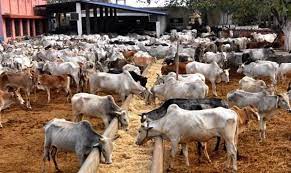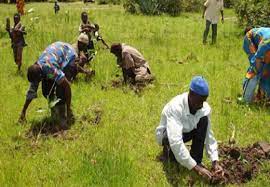Nigeria’s Minister of Agriculture and Rural Development, Dr. Akinwumi Adesina, has called on the global leaders in agricultural research to ensure that the vulnerabilities of poor farmers are considered and the farmers protected from the vagaries of climate change.
Adesina made the call recently in New York during the First CGIAR Development Dialogues, organised by the Consultative Group on International Agricultural Research at Columbia University, New York.
Adesina, in a keynote speech, observed that, “while climate change is global, their effects are local.” According to him, “we must not abandon farmers to climate change…The poor farmers in developing countries cannot on their own be expected to adapt to climate change. Unless serious actions are taken, they will suffer disproportionately from climate change. It is therefore imperative that specific actions be taken to address the challenges of farmers, especially smallholder and women farmers, to enable them to build more resilient livelihoods.”
He stressed the need “for countries to develop national climate change adaptation funds to allow them to support farmers and communities to adapt to and mitigate the impacts of climate change.” He added that “we must take our destinies in our own hands. We must focus on building economic buffers for farmers. Foremost among these measures must be the scaling up of weather index insurance to farmers. Priority must now be put into support for farmers to afford the premiums to improve access and affordability.”
Expressing concern for the home turf, Adesina warned that “nowhere is the urgency for action on climate change more important than in Africa.” In his view, “for good reason: over 65% of all the arable land left to feed the 9 billion people in the world by 2050 is in Africa. If we get climate change adaptation and mitigation right in Africa we will get future global food supply right.”
He suggested that, “more than ever before, we must achieve rapid increase in agricultural productivity in Africa and unlock the potential of agriculture to generate wealth. This will require a fundamental shift in approach to agriculture. We must cease treating agriculture as a development programme or a social sector. We must treat agriculture as a business that can lift millions out of poverty into wealth.”
The paradox, the minister observed was that, “while the GDP of African countries is rising and six of the ten fastest growing economies in the world are in Africa, sub-Saharan Africa still holds over 240 million hungry people. Eighty percent of the world’s stunted children live in 14 countries, eight of which are in Africa.” He noted that, although GDP is important, nobody eats GDP. “We must drastically reduce the number of poor and hungry in Africa, especially the high level of child malnutrition and stunting,” he said.
He laid emphasis on modern technologies as means towards improving agricultural productivities, adding that, “to succeed in raising food production, we must ensure that technologies reach farmers. As Dr. Norman Borlaug once said of technologies ‘take it to the farmers.’” He stressed the need for “smart policies, smart institutions, smart financing and smart technologies to support farmers to adapt to climate change.”
“To achieve this,” he said, “governments must increase investments in the development of agrometereological stations to allow for more accurate season rainfall forecasts.” For him, “greater focus will be also placed on improving water management, especially rainwater harvesting, water storage and conservation and improved water use efficiency. This is why Nigeria developed a National Agricultural Resilience Framework to mainstream climate change adaptation into the planning and implementation of all activities in the agriculture sector.”
“To reduce the vulnerability of smallholder farmers, especially to floods and droughts,” he disclosed, “government has launched a Planting with Peace Programme. Under this programme it is planned that 2.5 million farmers will get access to crop insurance in the first phase, starting in 2015. It is projected that by 2017, an additional 15 million farmers would be covered by crop insurance across Nigeria.” He recalled that, “in the last three years, over 14 million smallholder farmers received seeds and fertilisers from private sector input suppliers using their e-wallets. This allowed national food production to rise by an additional 21 million MT of food within three years, while improving the food security of over 50 million people.”
Going forward, for Africa, he reasoned, “governments must also increase support for investments in research into the development and dissemination of heat, drought and flood tolerant crop varieties to farmers.” According to him, “there is no doubt that investment in agricultural research has one of the highest rates of returns. Greater investments are needed to support agricultural research at global, regional and national levels, with sharper focus on global public goods and local adaptations.”
He acknowledged that “the work of the CGIAR has helped to change the lives and livelihoods of farmers,” calling for “greater support for the work of the CGIAR and its partners to help broaden options for farmers, as they adapt to climate change.”



